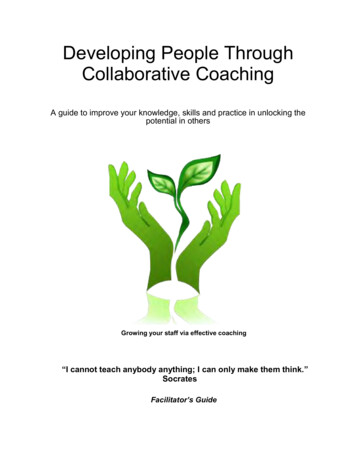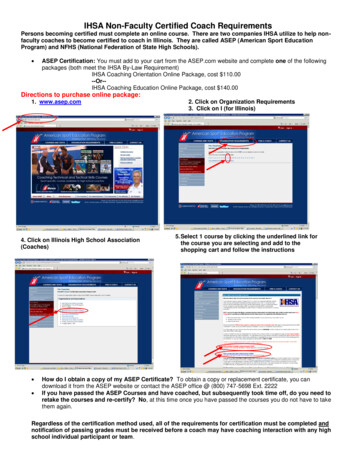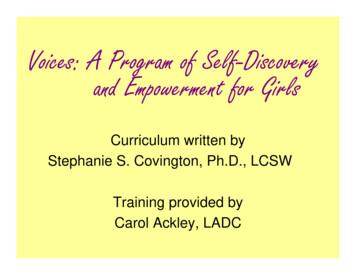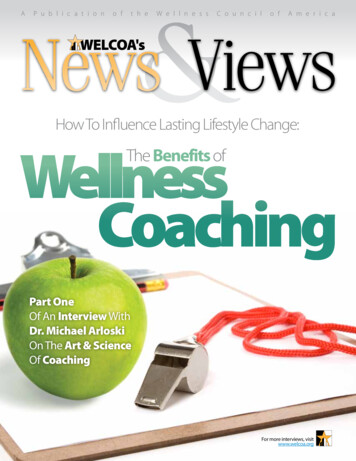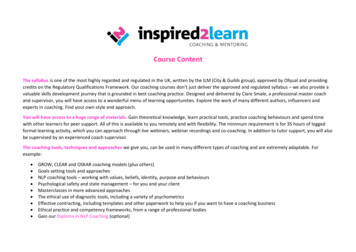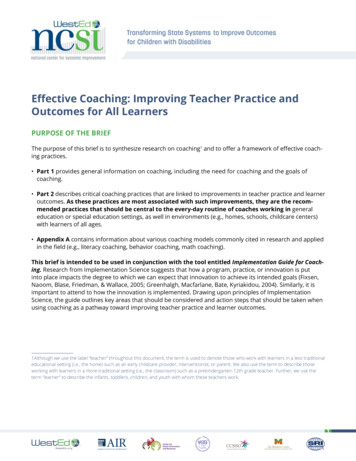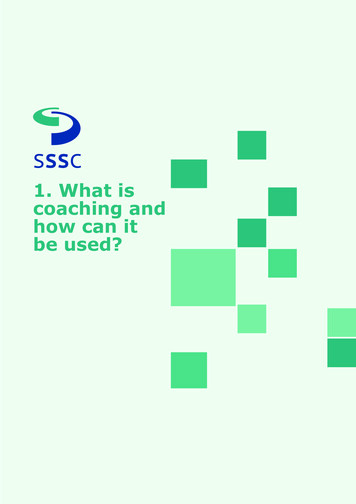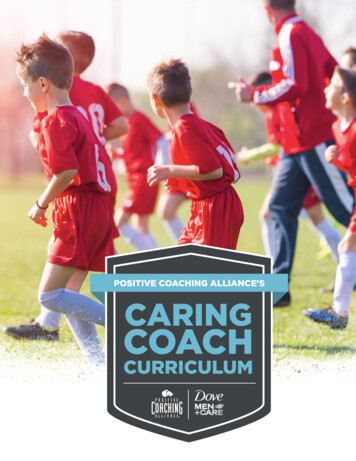
Transcription
POSITIVE COACHING ALLIANCE’SCARINGCOACHCURRICULUM
LETTER FROM JIM THOMPSONTHANK YOUfor being, or becoming, a Caring Coach. As Founder and CEOof Positive Coaching Alliance (PCA) – a national non-profit developing BETTER ATHLETES, BETTERPEOPLE through youth and high school sports, I think of a Caring Coach as a Double-Goal Coach .That is a positive coach who strives to win games and has an even stronger commitment to the moreimportant goal of teaching life lessons through sports.We at PCA are proud to partner with Dove Men Care in an unprecedented way to provide thiscurriculum. It is a resource that offers you, as a youth or high school coach, ideas and practical tipsto help you coach with care, enhancing your players’ experiences on and off the field. By coachingwith care, not only will you get more from your players as you help them grow and develop intostronger, healthier adults, you will also enhance your own experience as a coach. Additionally, if youare considering coaching but have not yet committed, we hope this curriculum will cause you tobecome a Caring Coach.The concepts and advice here draw heavily from PCA’s National Advisory Board, comprising 100 :»»Top athletes and coaches from the pro and college ranks»»World-class academic researchers in sports psychology and sociology»»Business and organizational leaders. who all understand peak performance and the amount of caring it takes to get people there.Research by Dove Men Care indicates that many youth and high school sports coaches perceive alack of resources to help them prepare their athletes for off-the-field experiences.1 However, in additionto drawing from our National Advisory Board, some of the best tips and tools among the 1,000 freeresources at PCADevZone.org and within the workshops we present for hundreds of schools and youthsports organizations throughout the U.S. come from people like you the every-day grassroots heroeswho commit their hearts and souls to coaching and caring for youth. And now, for the first time, thiscurriculum enables us to present to you many of the most relevant materials in one concise place.Jim Thompson is the Founder and CEO of Positive Coaching Alliance. PCA is a national non-profitorganization Jim started in 1998 to transform the culture of youth sports into a DevelopmentZone with the goal to develop Better Athletes, Better People. He is the author of nine books onyouth sports, and Jim has an MBA from Stanford University where he was the Director of PublicManagement Program.Jim has recruited an outstanding team that has helped PCA grow into a thriving nationwideorganization with 17 Chapters and an expansion plan that will reach 20 million youth athletes by 2020.PCA’s vision of youth sports as a Development Zone has attracted the support and involvement ofmany elite coaches, athletes, academics and business leaders in this country. PCA’s corps of more than100 Certified Trainers has delivered over 3,000 live workshops in 2017 for leaders, coaches, parentsand athletes.1Dove Men Care Deodorant Survey conducted by Edelman Berland in August 2015NOTE: Light blue, underlined text indicate a clickable link for more information and resources.DEODORANT
COACHING SPECTRUM“Sports are a tremendousplace to learn how toconnect, to learnhow to relate .It’s a critical place toteach relationshipsto young people.STEP 1 : IDENTIFY THE ROLE“Understand what it means tobe a Caring Coach so you candetermine how to be there foryour team both on and off thefield.STEP 2 : BE A CARING COACHSTEP 3 : REAP THE BENEFITSFROM YOUR PLAYERSMy greatest challengeas a coach was to get ayoung man to look backon his career and say,‘Coach pushed me as hardas he possibly could toget the most out of me,both as an athlete andalso as a person.’The more you care as acoach, the more fulfillingyour experience will be.““The scoreboardshouldn’t be yourdestination. Yourdestination shouldbe about buildingyoung people.“From being prepared togreat feedback for yourplayers, your example leadsyour team to becomingstrong and caring adults.“DEODORANT
STEP 1IDENTIFY THE ROLEThe origin of the word “coach” is tied to the centuriesold notion of a vehicle that delivers very importantpeople to their destinations. Therefore, by definition,your responsibility as a youth sports coach is to deliverthe children with whom you are entrusted – veryimportant people, ages five to 18 – to their destinationinto adulthood.While all of the athletes on your team may not becomeelite athletes, the final destination for all will involvethem as members of society. The lessons they learn onthe field today can impact their daily lives for years tocome.The only way to ensure your athletes’ safe arrival thereis to be a Caring Coach. By striving to win, you lead yourathletes to become their best, possessing the skill andknowledge needed to compete. By teaching life lessonsthrough sports, you equip them with even broader tools– tools they will use in family life, their communities andmaybe even as future Caring Coaches. These day-today elements of life, or “off-the-field” experiences, areinfluenced by the decisions that coaches make whenthey interact with their players each day during gamesand practices, and you have the opportunity to make adifference for your team every day.Here are a few PCA resources pertaining to the topic:»»Double-Goal Coach Job DescriptionPrintable PDF that outlines the major principles ofa Double-Goal Coach»»Bob McKillop: The Value of Caring andCoaching Stephen CurryPodcast with Stephen Curry’s Davidson Collegebasketball coach»»Joe Ehrmann on Building RelationshipsThrough SportsVideo featuring former NFL player and Founderof Coach for America1Dove Men Care Deodorant Survey conducted by Edelman Berland in August 20152Dove Men Care Deodorant Survey conducted by Edelman Berland in August 2015NOTE: Light blue, underlined text indicate a clickable link for more information andresources.MORE INFOCoaches also have an obligation tocare for themselves. They must remainphysically, mentally and emotionally fit inorder to help youth achieve that fitness.Fortunately, coaching often pays backdividends in all those areas. A majority ofcoaches say that coaching makes thempersonally feel more involved, proud,happy and caring.1Often, coaching may entail your workingout or participating in drills with yourplayers. Even a certain amount of pacingand moving from one practice stationto the next keeps you active. Of course,mental sharpness is critical to any kindof success, and the fluidity of sport isbound to keep you alert and adaptive.And, in terms of emotional fitness, or realstrength, there is perhaps nothing moreintrinsically rewarding than watchingyouth develop under your direction. Byshowing your care on and off the field,you are able to help guide your athletesthrough their lives and enable themto feel more empowered when facingdecisions with their friends, families andschools.It’s no wonder that 70% of coachesidentify themselves as a coach, which isjust as many that identify as a husband,father or other key roles. Furthermore,94% say that coaching has enabledthem to be positive role models in theircommunities.2DEODORANT
STEP 2BE A CARING COACHThe two key principles of a Caring Coach are:1) focusing on Mastery of Sport; and 2) FillingEmotional Tanks.Mastery of SportAs opposed to the traditional concept of winning –by outscoring the opponent – winning can also beevaluated by the Mastery of Sport. To convey theconcept of Mastery, PCA uses an acronym, ELM, forEffort, Learning and Mistakes are OK. Emphasizingthose values and lessons with youth athletes givesthem a sense of control, which increases confidence,reduces anxiety and frees them to be as aggressiveand creative as possible with no fear of mistakes andan understanding that the scoreboard results arebeyond their control anyway.It’s important to remind your athletes that winningin the Mastery of Sport is the most important kind,and it’s good to incorporate these conversations intopractices and team meetings as often as you can.Remind your team of ELM often, and feel free to playaround with this sample script to make it mean themost for them. Some key conversation starters:E is for Effort – It’s more important to me thatwe try our hardest than if we win. If we try ourhardest and lose, I’ll still be proud of our team.L is for Learning – Let’s always continuelearning and improving every time we come outhere. Getting better than we are now is moreimportant that being better than another team.M is for Mistakes – No one likes making mistakes,but they are important for learning. To learn, youneed to challenge yourselves and on our team,it’s ok to make mistakes.Filling Emotional TanksThe concept of the Emotional Tank equates witha car’s gas tank: when it’s full, we can go mostanywhere, but when it’s empty we go nowhere.Research indicates that coaches should fuel theirathletes’ Emotional Tanks with an average of five (5)pieces of truthful and specific praise for every one (1)piece of specific, constructive criticism.Why that “Magic Ratio” of 5:1? The praise keepsathletes uplifted, energetic and open to learning, sothat when correction is needed, they can accept anduse it to continue improving. Look to this samplescript to determine the best ways to fill your ownteams’ tanks. Of course, improvement breeds evenmore confidence and contributes to a virtuous cycleof Mastery.The ELM Tree of Mastery and Filling Emotional Tanksare the basis for the emotional bonding with playersthat is the hallmark of a Caring Coach. AdditionalPCA resources on these topics include:Phil Jackson On The Magic RatioVideo from 11-Time NBA Champion CoachCollege Football Hall of Famer Pat Fitzgerald onthe Best Coaching Philosophy in Youth SportsPhilosophy in Youth SportsVideo-based advice from Northwestern UniversityFootball CoachImportance of Filling the Emotional Tank FromCollege Football Hall of Famer Ronnie LottAudio resource on the ways in which Filling theEmotional Tank can positively affect athletes andteamsHow To Build Athlete ConfidenceA video-based anecdote from NorthwesternUniversity Basketball Coach Chris CollinsNOTE: Light blue, underlined text indicate a clickable link for more information and resources.DEODORANT
STEP 3REAP THE BENEFITSFROM YOUR PLAYERSAs you care for and give to your players – offering advice,time and an open ear – you gain as much in return. Thepersonal enrichment that comes from developing youth isincomparable.Legendary UCLA Basketball Coach John Woodenreportedly once was asked at the end of a season how wellhe’d coached, and he answered, “Ask me in 20 years andwe’ll see how successful these boys are. Then I’ll be able totell you if I succeeded as a coach.”That is the mindset, vision and long-term approach of aCaring Coach. Many measure their success in terms ofwedding invitations they receive, the unforeseen letter ore-mail of thanks and acknowledgement of positive impactdecades after the fact, and how often on the street or inthe grocery store line they hear a cheery “Hey, Coach” fromformer athletes they may no longer even recognize.Regardless of pay (if any!) and your win-loss record,you can rest assured that as a Caring Coach you workedwonders in the lives of youth and that many of them willgrow into people who have that same effect on others creating a ripple effect of caring that is your legacy.MORE INFOReaching your potential as aCaring Coach is a journey, moreevolution than revolution. It is noteasy. Occasionally, it will requiresome difficult looks at the mirror.But it is worth it, as coaching withcare will enhance your life just asmuch as it does for the athletes onyour team. Here are videos fromESPN Basketball Commentatorand Former College Coach FranFraschilla about his journey tobecoming a Caring Coach.How to Get the Most From PlayersWithout Demeaning ThemRevelations of how a coach’sinsecurity can get in the way ofcaringHow to Get Emotionally Attachedto AthletesTropper Johnson, a wheelchairbasketball coach, explains hownatural it is to care about yourplayers, and how becomingcommitted to them enables youto experience the most joy whencoachingDoc Rivers on BondingWith PlayersVideo featuring past NBAChampionship CoachNOTE: Light blue, underlined text indicate a clickable link for more informationand resources.DEODORANT
HOW COACHING ENRICHES COACHES’ LIVESCoaches are fulfilled by caring for their teams. By seeing how they can affect their players’ lives onand off the field, they are able to positively enhance their own. The results of the Dove Men Caresurvey not only prove that coaching helps coaches in the same way it helps the athletes, but alsothat coaching makes them stronger. The research also shows that coaches set an example for theirplayers, and feel more confident in their work, when they take care of their appearance.1Sample included 1,087 men ages 25-60 who currently coach youth or high school sports, or havedone so in the last five years.COACHES ARE FULFILLED COACHES ARE CONFIDENT96%OF COACHES SAYCoaching enrichestheir life personally.98%OF COACHES SAYEnsuring players feel confident inthemselves is a fulfilling part of coaching,and 95% say they find fulfillment in teachingplayers to care for each other.Coaching has enabled coaches to supportand encourage others (98%), strengthentheir ability to teach and guide others(96%), and be a positive role model in theircommunity (94%).84%Coaching makes menmore confident inthemselves.9in 10Taking care of theirappearance sets anexample for how theirplayers should act andpresent themselves.SAY(92%) SAYA majority of coaches say that coachingmakes them feel HAPPIER and INSPIRED.Coaching also makes them feel moreCoaches identify asstrongly with beinga coach (67%) asbeing a father (65%).INVOLVED, PROUD, CARING, MOTIVATED.COACHES ARE STRONG78%of coaches credit coachingfor helping them growemotionally stronger.Among coaches who are fathers, they saythey have been able to teach their childrento be a team player (81%) and be moreconfident (79%).9 in 10SAY BEING A COACHhas helpedthem be abetter fatherhas helped themnot give up in theface of obstacles1Dove Men Care Deodorant Survey conducted by EdelmanBerland in August 2015DEODORANT
ADDITIONAL TOOLS & RESOURCESKEY PCA LINKS:PCADevZone.org1,700 free printable and audio-video resources for youthand high school coaches, sports parents, student-athletes,officials and school/organizational leadersPositiveCoach.orgPCA’s homepagePCA Workshops, Online Courses and BooksBring PCA’s live and/or online training to your school oryouth sports organizationAsk PCA BlogAsk and answer questions about youth and high schoolsportsReceive Talking Points E-mail SeriesA season-long weekly set of guides on topics for coachesto discuss with their youth athletesSubscribe to PCA’s Monthly E-NewslettersKeep up with the PCA Movement and get monthly digestsof our latest free resourcesContact a PCA Chapter Near YouWe have 17 Chapters nationwide!Support PCAContribute to our non-profit so we can impact as manyyouth as possibleNote: Individuals appearing in PCA resources in this Curriculum are volunteers on PCA’s National Advisory Boardor are otherwise affiliated with PCA and are not representatives of Dove Men Care.DEODORANT
DEODORANT THANK YOU for being, or becoming, a Caring Coach. As Founder and CEO of Positive Coaching Alliance (PCA) - a national non-profit developing BETTER ATHLETES, BETTER PEOPLE through youth and high school sports, I think of a Caring Coach as a Double-Goal Coach . That is a positive coach who strives to win games and has an even stronger commitment to the more



